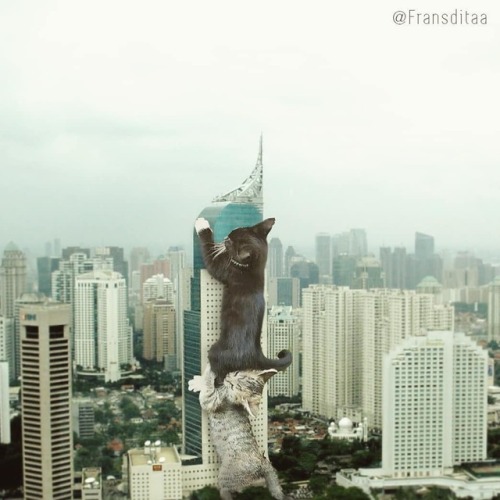Iphleandro-blog - Real

More Posts from Iphleandro-blog and Others

Ammonites on Matrix (Quenstedtoceras sp., Jurassic) - Volga River, Ulyanovsk, Russia
This extremely artistic assemblage of large and small ammonites from Russia demonstrate an intense iridescence and highlights due to the presence of metallic Pyrite. The cluster has been positioned on a new matrix, as the grainy rock in which these Quenstedtoceras cephalopods were collected is not hard nor stable enough to display them permanently. The added component is an attractive piece of what is known as septarian, a mud-like material that grows in nodules. In this instance, yellowish Calcite crystals and gray sediment have formed the rock on which these colorful ammonites reside. The cluster is quite representative of the Volga River material, and that combination results in a dramatic display specimen.
Overall Measurements: 6.30 x 5.51 x 5.71 inches (16.00 x 14.00 x 14.50 cm)
A fórmula simplificada da fotossíntese é a seguinte:
6 CO2 + 12 H20 => C6H12O6 + 6 O2 + 6 H2O
http://www.mundoeducacao.com.br/biologia/fotossintese.htm

(Image caption: An electron micrograph image shows a parallel fiber-Purkinje cell. The presynaptic cell, a parallel fiber, is colored red while the postsynaptic cell, a Purkinje cell, is colored green. Credit: OIST Computational Neuroscience Unit)
Scientists Illuminate Mechanism at Play in Learning
The process we call learning is in fact a well-orchestrated symphony of thousands of molecular reactions, but the exact interplay between these reactions remains largely unknown. Now, researchers at the Okinawa Institute of Science and Technology Graduate University (OIST) have modelled the molecular basis of learning in the cerebellum, a part of the brain that receives sensory input and coordinates voluntary movements.
“As far as we know, this is the most complex model of such a system that exists,” said Erik De Schutter, head of OIST’s Computational Neuroscience Unit and senior author on the recent paper, published in Cell Reports. Previous models focused on the signals that arrive at the receiving end of a neuron, he said, “whereas now we’re looking at the ongoing communication between the two ends.”
Learning is thought to be a balance between two processes that act as a kind of molecular dial: long-term potentiation (LTP), in which the connection between two neurons is strengthened, and long-term depression (LTD), in which the connection between two neurons is weakened. Both these processes take place at the synapse—the junction between two neurons. Andrew Gallimore, first author on the paper and a postdoctoral researcher at OIST, modeled how they work in two types of cells: parallel fibers and Purkinje cells, which play a key role in motor learning.

(Image caption: Learning is thought to be a balance between two processes that act as a kind of molecular dial: long-term potentiation (LTP), in which the connection between two neurons is strengthened, and long-term depression (LTD), in which the connection between two neurons is weakened. Such a large, comprehensive model allows scientists to examine how complex signaling systems work together. Credit: OIST Computational Neuroscience Unit)
Using a computer program to create a model of this complex system, Gallimore combined several hundred equations taken from experiments in which such neurons were activated. The model was put to the test when colleagues in Korea took recordings from neurons in the cerebellum of mice. The OIST researchers then incorporated these recordings into the model.
Their findings show that the molecular networks on both sides of a synapse are important for controlling learning: communication must occur in both directions across the synapse to control whether LTD or LTP is generated during neural activity.
The model also showed that the molecular dial balancing LTP and LTD has an automatic off-switch that, when triggered, allows the system to return to its resting state. Although previous research hinted at the presence of this off-switch, this is the first time that the mechanism behind it—a complex network of proteins and receptors—has been demonstrated. Such a large, comprehensive model allows scientists to examine how complex signaling systems work together, something that is often absent in experimental literature, De Schutter said.
The researchers’ work allows scientists to more accurately predict the behavior of the chaotic, complex system of molecules that controls learning. It also hints at what might be happening at the molecular level when these switches break—which might occur when the brain is injured or during neurodegenerative diseases that affect learning.
“The whole function of a brain is based on the strengths of these synaptic connections,” said Gallimore. “The better we understand these processes, the greater potential there is to intervene to mitigate severe problems.”
Sure

follow for non-stop astrology updates


Ammonite Fossil (Goniatite, Devonian) - Atlas Mtns, Morocco


Just lying here in waiting for the mold makers. The full-size Triceratops from Jurassic Park, sculpted in clay at Stan Winston Studio, lead artist Joey Orosco. 🦕 #jurassicpark #dinosaur #triceratops #ttops #stanwinstonstudio #behindthescenes #practicaleffects #specialeffects #hollywood #moviemagic #clay #sculpture #model #dinomania #dinomaking #blockbuster https://ift.tt/2FU6ysO

Sittin at the desk










Catzillas: Giant Cats In Urban Landscapes
Indonesian artist Fransdita Muafidin publishes a series of photomontages with kittens and fat adult cats among the urban landscapes from around the world.
Via Design You Trust
-
 yznko liked this · 3 years ago
yznko liked this · 3 years ago -
 nereaurl reblogged this · 5 years ago
nereaurl reblogged this · 5 years ago -
 sstr-streat liked this · 5 years ago
sstr-streat liked this · 5 years ago -
 number24 liked this · 5 years ago
number24 liked this · 5 years ago -
 brightxn reblogged this · 6 years ago
brightxn reblogged this · 6 years ago -
 kanade19 liked this · 6 years ago
kanade19 liked this · 6 years ago -
 anacunhasr-blog liked this · 6 years ago
anacunhasr-blog liked this · 6 years ago -
 shesmysunx liked this · 6 years ago
shesmysunx liked this · 6 years ago -
 purplesharkcowboytoad-blog liked this · 6 years ago
purplesharkcowboytoad-blog liked this · 6 years ago -
 ineedyourprotectionbemysamurai reblogged this · 6 years ago
ineedyourprotectionbemysamurai reblogged this · 6 years ago -
 gng0r-blog liked this · 6 years ago
gng0r-blog liked this · 6 years ago -
 ennatha reblogged this · 6 years ago
ennatha reblogged this · 6 years ago -
 ennatha liked this · 6 years ago
ennatha liked this · 6 years ago -
 whocares2613 reblogged this · 6 years ago
whocares2613 reblogged this · 6 years ago -
 withlovesk liked this · 6 years ago
withlovesk liked this · 6 years ago -
 mandalishss reblogged this · 6 years ago
mandalishss reblogged this · 6 years ago -
 mandalishss liked this · 6 years ago
mandalishss liked this · 6 years ago -
 themindbetweenthelines liked this · 6 years ago
themindbetweenthelines liked this · 6 years ago -
 luzaree-blog liked this · 6 years ago
luzaree-blog liked this · 6 years ago -
 itzmissfizzle-blog liked this · 6 years ago
itzmissfizzle-blog liked this · 6 years ago -
 beautifulphotographytrading-blog liked this · 6 years ago
beautifulphotographytrading-blog liked this · 6 years ago -
 scraft-ss liked this · 6 years ago
scraft-ss liked this · 6 years ago -
 lov3letters reblogged this · 6 years ago
lov3letters reblogged this · 6 years ago -
 in-futility reblogged this · 6 years ago
in-futility reblogged this · 6 years ago -
 lisnaturalz-blog liked this · 6 years ago
lisnaturalz-blog liked this · 6 years ago -
 arybm-blog1 liked this · 6 years ago
arybm-blog1 liked this · 6 years ago -
 arybm-blog1 reblogged this · 6 years ago
arybm-blog1 reblogged this · 6 years ago -
 yamsstillfuckshoes liked this · 6 years ago
yamsstillfuckshoes liked this · 6 years ago -
 francescatrinca liked this · 6 years ago
francescatrinca liked this · 6 years ago -
 og-athens reblogged this · 6 years ago
og-athens reblogged this · 6 years ago -
 emphh reblogged this · 6 years ago
emphh reblogged this · 6 years ago -
 amar2501-blog liked this · 6 years ago
amar2501-blog liked this · 6 years ago -
 hi-im-helpless reblogged this · 6 years ago
hi-im-helpless reblogged this · 6 years ago -
 comeoninwhereitallbegins reblogged this · 6 years ago
comeoninwhereitallbegins reblogged this · 6 years ago -
 comeoninwhereitallbegins liked this · 6 years ago
comeoninwhereitallbegins liked this · 6 years ago -
 sunkisssedandbronzed reblogged this · 6 years ago
sunkisssedandbronzed reblogged this · 6 years ago -
 poppyy-flower liked this · 6 years ago
poppyy-flower liked this · 6 years ago -
 livingbypassion-blog1 liked this · 6 years ago
livingbypassion-blog1 liked this · 6 years ago -
 satans-my-bestfriend reblogged this · 6 years ago
satans-my-bestfriend reblogged this · 6 years ago